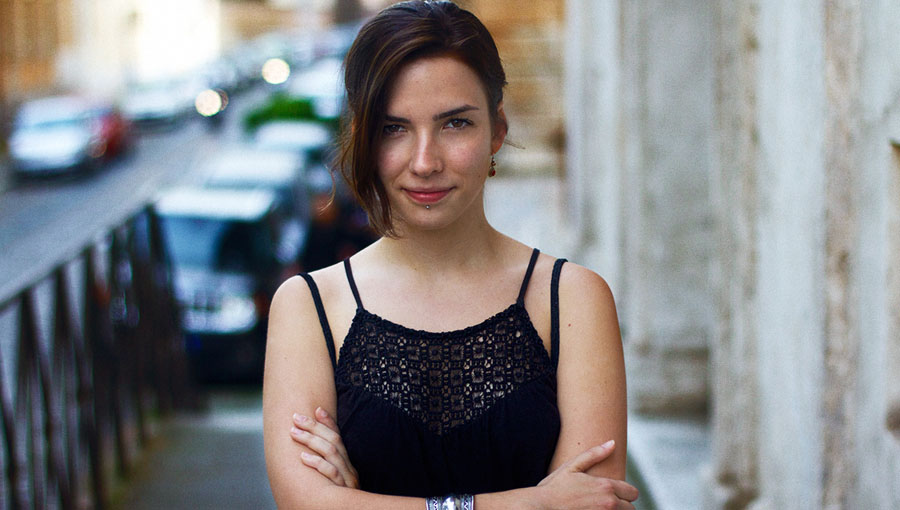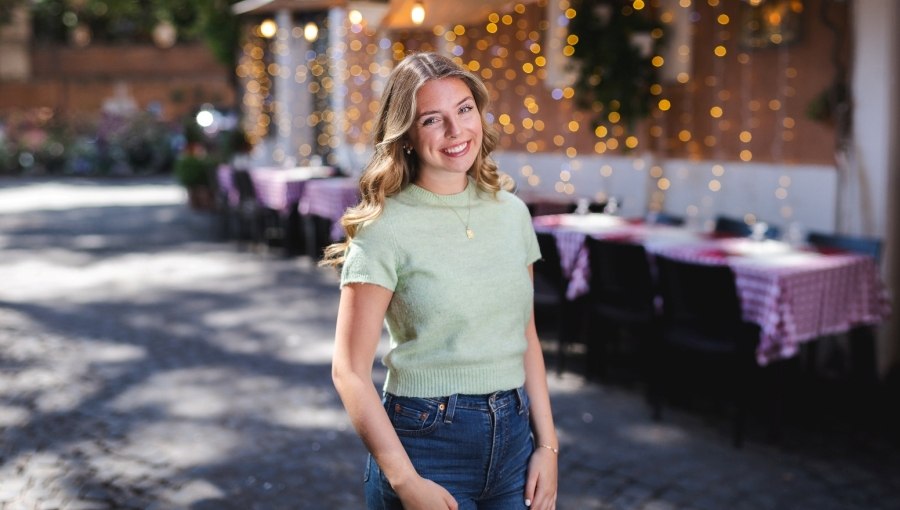A Tale of Two Cultures: English Literature Student Marina Traylor
Born in Rome to an American father and an Italian mother, Marina Traylor (class of 2019) is an English Literature major and International Affairs minor. Currently, she is the president of the Women’s Leadership Initiative.
Tell us a bit about your background.
My father is from Indianapolis. He came to Rome as a study abroad student with Temple University and ended up staying a bit longer than a semester. Next year will be his 40th year living in Rome. My mother is from a small town in Molise, in southern Italy. Ever since I was little, my parents made sure that I grew up bicultural as well as bilingual. They got me subscriptions to American children’s magazines, read to me in English, and showed me American cartoons and TV shows. I am grateful for that because this double perspective has made me critical and inquisitive on both cultures from a very young age. During my childhood and my adolescence, I had many different aspirations for my future. I wanted to become a painter, a politician, an actress, a drummer, and a journalist. It was only during my high school years, studying languages and literature at Liceo Virgilio in Rome, that I understood that literature was the thing I loved the most. I realized that studying it was the best way to my happiness and self-fulfillment.
What made you decide to come to JCU?
I used to walk by John Cabot every day on my way home from school. So when my older sister had to choose a university, I casually suggested it to her. She ended up applying to JCU and graduated with a major in International Affairs. I would sometimes meet up with her on campus and I was pleasantly surprised by the cosmopolitan yet familiar environment of JCU. When it became my turn to choose, I was torn between my desire to work to change the political situation in Italy and my unconditional love for literature. I was happy to find that at John Cabot I could do both.
You are an English Literature major and an International Affairs minor: how did you come to choose this combination? What do you like most about your English Literature and International Affairs/Political Science courses?
I came to JCU with two objectives. One was to improve my communication skills and become a good writer. Literature, especially fiction, provides fascinating inquiries into human nature and behavior, and it has always helped me better understand myself and the people who surround me. I also wanted to further my understanding of politics and its power over the social inequality that affects minorities and disadvantaged groups around the world. During my studies I have learned a lot from both disciplines: in my literature courses I have improved my use and understanding of the English language and have discovered books that I would probably have never come across on my own. In my political science classes, I have developed a critical perspective on current events and a clearer view of the dynamics of institutional politics.
Are there any professors who have made a significant impact on you and why?
It is hard to decide which professors have impacted me the most. The professors from the literature department each have their own teaching method and philosophy, which is one of the things that make studying literature here so exciting. When it comes to international affairs courses, I think the class that has had the greatest impact on me was Comparative Politics with Professor Michael Driessen. The class introduces a variety of different political systems and applies theory to contemporary and historic events. I took that class a year ago and it gave me new insights and a lot of food for thought.
How did you get involved with the Women’s Leadership Initiative? What is WLI’s mission?
I got involved in WLI over a year ago. I met former president Kiriko Mechanicus at the Rome Women’s March in 2017. She told me about the club and its upcoming projects, and I started to participate in its activities. When I saw all the amazing things Kiriko was doing I became increasingly involved and enthusiastic, so much so that I became part of the board, and when Kiriko left I had developed my own vision of the club and ended up becoming president. WLI’s mission is to promote feminist discourse and gender equality on campus. When you study in a liberal arts university, you tend to have the impression that the outside world gives these issues the same attention that they get on college campuses. Most of our projects aim to prepare women to defend themselves in sexist environments, raise awareness of gender inequality, and promote respect and empathy.
On the occasion of International Women’s Day 2018, JCU’s Women’s Leadership Initiative hosted a week-long series of events. Did any of the events strike you as being especially significant?
Hosting Women’s Week was the best experience I’ve had at JCU so far. I was honored to interview journalists Francesca Caferri and Barbie Latza Nadeau in our opening event. They gave us invaluable insights on what it’s like to be a female journalist today, both in Italy and in the U.S. It was also interesting to talk with our students and faculty about how to get rid of the limitations that gender expectations can impose on female students. Most of all, it was moving to hear the voices of some of the courageous and empowering women of our community on Women’s Day.
What are your future plans?
My objective is to make literature as accessible as possible and encourage the distribution of works by a diverse authorship. I would like to organize events and workshops in places that would otherwise have little or no access to education by inviting authors to discuss their experiences. I would also like to write about situations that would normally be ignored. We are experiencing a historical moment where we are all certain of our own opinions and we are not used to peaceful and understanding confrontation. The fact that mass media portrays marginalized groups as criminals or just numbers doesn’t help. I believe that literature is a great means through which we can rediscover our similarities since it allows us to tell stories where marginalized groups are re-humanized and given substance and dignity.






